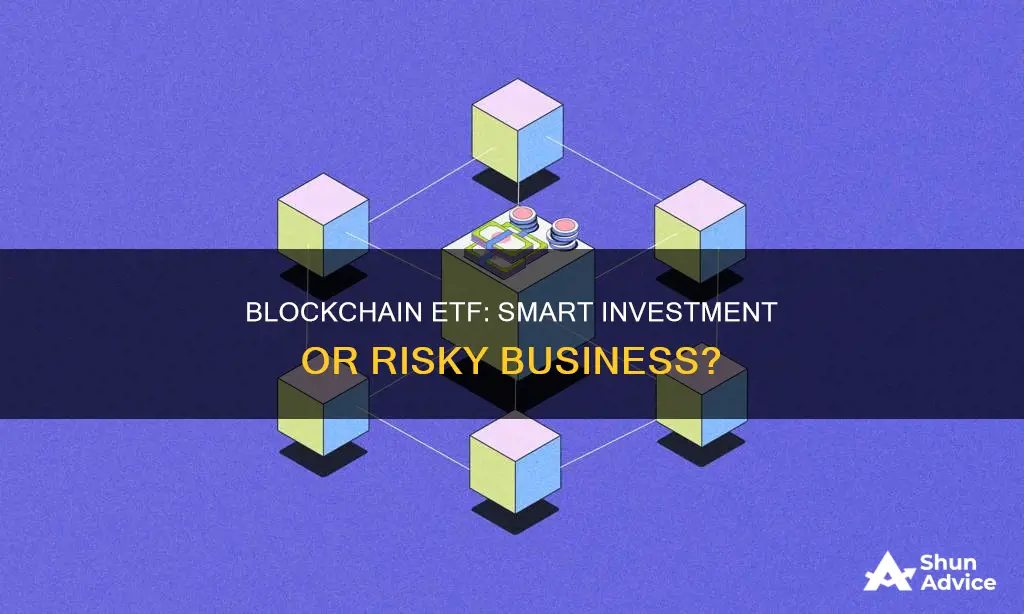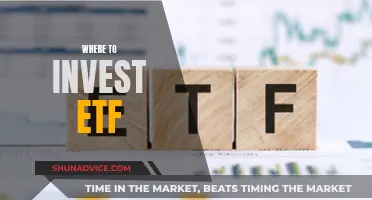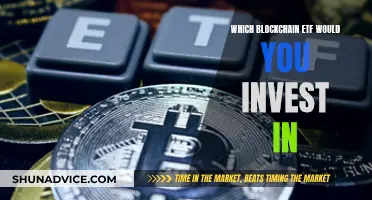
Blockchain ETFs are a great way to invest in blockchain technology without directly buying crypto. They are a type of exchange-traded fund (ETF) that holds stocks in companies involved with the development and use of blockchain technology. Blockchain ETFs are different from cryptocurrency ETFs, which track the price performance of digital tokens. With a blockchain ETF, you gain exposure to a group of stocks in the blockchain industry, including companies from banking, financial, technology, IT services, hardware, and telecom sectors. While there are risks associated with investing in this emerging technology, blockchain ETFs offer a less risky way to invest in the future of the financial services sector and provide diversification in your investment portfolio.
| Characteristics | Values |
|---|---|
| Type of Investment | Exchange-Traded Funds (ETFs) |
| Type of Asset | Blockchain-based ETFs |
| Investment Risk | High |
| Investment Options | Amplify Transformational Data Sharing ETF (BLOK), Siren Nasdaq NexGen Economy ETF (BLCN), First Trust Indxx Innovative Transaction & Process ETF (LEGR), Bitwise Crypto Industry Innovators ETF (BITQ), Global X Blockchain ETF (BKCH) |
| Top Holdings | Core Scientific Inc (CORZ), Galaxy Digital Holdings (GLXY), MicroStrategy Inc (MSTR), Coinbase Global (COIN), Block Inc (SQ), Intel (INTC), JD.com (JD), Paypal Inc (PYPL), Mara Holdings Inc (MARA), TeraWulf Inc (WULF), Iris Energy LTD (IREN), Nvidia (NVDA), CME Group (CME), Oracle Corporation (ORCL), AT&T Inc (T), Taiwan Semiconductor Manufacturing Company Ltd (TSM), Deutsche Telekom AG (XETRA:DTE.DE), Marathon Digital Holdings (MARA), Riot Blockchain (RIOT), Hut 8 Mining (HUT) |
| Expense Ratio | 0.45% p.a. - 0.76% |
| Assets Under Management | $702 million - $151 million |
What You'll Learn

What is blockchain technology?
Blockchain technology is a database mechanism that allows transparent information sharing within a business network. It is a decentralised, distributed ledger that stores records of ownership of digital assets. It is also described as a digital ledger that is distributed across a network of users.
Blockchain technology is made up of blocks of data that are linked together in a chain. The data is chronologically consistent because you cannot delete or modify the chain without consensus from the network. Each transaction is recorded, then stored in a block on the blockchain. Each block is encrypted for protection and chained to the preceding block, establishing a code-based chronological order. This means that, without the consensus of the network, data stored on a blockchain cannot be deleted or modified.
Blockchain technology is used to create an unalterable or immutable ledger for tracking orders, payments, accounts, and other transactions. The system has built-in mechanisms that prevent unauthorised transaction entries and create consistency in the shared view of these transactions. It is a trustless and transparent data exchange system.
The blockchain principle can be applied to many industries, processes and cases. It is the basis for cryptocurrencies such as Bitcoin. It can also be used for contracts, for certification of property rights, in logistics and for many other purposes.
ETFs: A Pooled Investment Option for Diversified Portfolios
You may want to see also

How to invest in blockchain
Blockchain ETFs are a great way to invest in blockchain technology without directly buying crypto. Blockchain ETFs are exchange-traded funds that hold stocks in companies that use, develop, or profit from blockchain technology. This means that you can invest in a diversified set of companies that may have cryptocurrency on their balance sheet or engage with blockchain technology in other parts of their business.
Exchange-Traded Funds (ETFs)
ETFs are a good option for those who want to invest in blockchain without the risk of buying crypto directly. ETFs are baskets of securities that trade on an exchange, just like a stock. They are a good option for those who want to invest in blockchain technology because they offer exposure to a diverse range of companies that are developing or using blockchain.
- Amplify Transformational Data Sharing ETF (BLOK)
- Siren Nasdaq NexGen Economy ETF (BLCN)
- First Trust Indxx Innovative Transaction & Process ETF (LEGR)
- Bitwise Crypto Industry Innovators ETF (BITQ)
- Global X Blockchain ETF (BKCH)
Buy Shares of Companies that Use or Develop Blockchain Technology
If you want to invest in individual companies that are using or developing blockchain technology, you can buy their shares directly. This option may be riskier than investing in an ETF, as you are not diversifying your investment across multiple companies. Some companies that use or develop blockchain technology include:
- MicroStrategy
- Coinbase
- Block
- Riot Platforms
- SBI Holdings
- Nvidia
Invest in Crypto
If you want to invest in blockchain technology, you can also choose to invest in cryptocurrencies directly. This option is riskier than investing in ETFs or individual stocks, as the crypto market is highly volatile. However, it can also offer the potential for higher returns. Some popular cryptocurrencies that use blockchain technology include:
- Bitcoin
- Ethereum
- XRP
- Cardano
Remember, it is always important to do your own research and consult with a financial advisor before investing.
Robin Hood's ETF Investment: What You Need to Know
You may want to see also

Cryptocurrency vs blockchain ETFs
Overview
Cryptocurrency and blockchain ETFs are both financial products that offer exposure to the performance of digital assets and the broader blockchain industry. However, there are several key differences between the two that investors should be aware of before deciding which one to invest in.
Cryptocurrency ETFs
Cryptocurrency exchange-traded funds (ETFs) track the price performance of cryptocurrencies by investing in a portfolio linked to their instruments. These ETFs trade on regular stock exchanges, and investors can hold them in standard brokerage accounts. Cryptocurrency ETFs provide a way for investors to gain exposure to cryptocurrencies without having to buy and store the digital assets themselves. This helps to reduce the learning curve and provides more security for investors, as they don't have to worry about the security of their digital wallets.
Blockchain ETFs
Blockchain ETFs, on the other hand, offer a more diversified exposure to the broader blockchain industry. These funds invest in companies that are involved in the development and use of blockchain technology across various sectors, such as finance, supply chain management, and healthcare. Blockchain ETFs primarily track the stock market prices of companies that have invested in blockchain technology, rather than focusing on a specific cryptocurrency. This means that blockchain ETFs tend to be more stable compared to cryptocurrency ETFs, as they are not exposed to the same level of price volatility.
Key Differences
- Focus: Cryptocurrency ETFs focus on the performance of specific cryptocurrencies, while blockchain ETFs focus on companies working with blockchain technology.
- Investment Type: Cryptocurrency ETFs invest in cryptocurrencies or futures contracts linked to their performance. Blockchain ETFs invest in company stock and are not directly exposed to the performance of any particular cryptocurrency.
- Stability: Cryptocurrency ETFs tend to be more volatile due to the price swings in the crypto markets. Blockchain ETFs are relatively more stable since they are not directly tied to the price of any specific cryptocurrency.
- Risk Profile: Cryptocurrency ETFs carry more risk due to the high volatility of the crypto markets. Blockchain ETFs may still experience market-related and macro risks, such as pricing valuations and government regulation.
- Diversification: Cryptocurrency ETFs provide exposure to a specific cryptocurrency or a basket of cryptocurrencies. Blockchain ETFs offer diversification across a range of companies and sectors that are adopting blockchain technology.
Both cryptocurrency and blockchain ETFs offer investors a way to gain exposure to the growth of digital assets and blockchain technology. Cryptocurrency ETFs provide more direct exposure to the price performance of cryptocurrencies, while blockchain ETFs offer a more diversified approach by investing in a range of companies utilising blockchain. Investors should consider their risk tolerance, investment goals, and the level of diversification they desire before deciding which type of ETF to invest in.
A Beginner's Guide to Silver ETF Investing
You may want to see also

Risks associated with blockchain ETFs
Blockchain ETFs carry the inherent risk of non-performance, non-adaptability, or failure of the blockchain ecosystem. The success of blockchain ETFs depends on the evolution of the overall ecosystem, the reliability and stability of the blockchain network, its configuration, and its successful adoption.
Another risk is that blockchain ETFs may invest in early-stage technology companies, which are prone to failure. While diversification through ETFs mitigates stock-specific risk, the risk of specific holdings underperforming remains.
Additionally, blockchain ETF holdings often overlap with existing technology and internet companies, which may derive a larger share of their revenues from non-blockchain products and services. For example, some blockchain ETF holdings might generate most of their revenue from networking equipment and computer processors, with only a limited share of hardware used in blockchain systems. In such cases, the overall returns are vulnerable to the non-performance of their majority non-blockchain segments.
Blockchain ETFs also carry the risk of higher expense ratios and trading charges. For instance, the Siren Nasdaq NexGen Economy ETF (BLCN) and Amplify Transformational Data Sharing ETF (BLOK) have expense ratios of 0.68% and 0.75% respectively, which are significantly higher than the SPDR S&P 500 ETF (SPY) fund's expense ratio of 0.09%.
Finally, blockchain ETFs tend to come with additional sources of volatility. These risks can be market-related, such as pricing valuations or sudden changes in investor sentiment, or they can be macro risks, such as additional government regulation.
Investing in the Future: 5G ETF Opportunities
You may want to see also

Blockchain ETFs vs crypto ETFs
Blockchain ETFs and Crypto ETFs are two different financial instruments that have gained investor interest as Bitcoin has earned a stable place within the investment community. While blockchain ETFs offer diversified exposure to the broader blockchain industry, crypto ETFs provide more direct exposure to the price movements of cryptocurrencies like Bitcoin.
Blockchain ETFs
Blockchain Exchange-Traded Funds (ETFs) are a type of exchange-traded product (ETP) that offers investors access to companies pursuing blockchain-based strategies. Blockchain ETFs primarily track the stock market prices of companies that have invested in blockchain technology. The funds invest in companies involved in the transformation of business applications through the development and use of blockchain technology.
Blockchain ETFs are not tied to a specific company or product, and they can provide exposure to various sectors, including finance, supply chain management, and healthcare. They tend to be more stable compared to crypto ETFs due to their lack of exposure to Bitcoin's price swings. However, the stock prices of companies tracked by blockchain ETFs are more susceptible to factors that do not directly affect blockchain technology.
Crypto ETFs
Crypto ETFs, or Bitcoin ETFs, provide investors with more direct exposure to the price movements of Bitcoin or other cryptocurrencies. These ETFs either hold Bitcoin directly or track its price through futures contracts, allowing investors to benefit from Bitcoin's price appreciation without the need to store the cryptocurrency themselves.
Crypto ETFs are relatively new and tend to be more volatile than blockchain ETFs. They are affected by regulations on Bitcoin and other cryptocurrencies and are influenced by events in the cryptocurrency market, such as regulatory news, adoption by major institutions, or economic events affecting investor sentiment.
Key Differences
- Blockchain ETFs focus on companies that work with blockchain technology and invest in company stock rather than cryptocurrencies.
- Blockchain technology is explored by many companies and is not tied to a specific business or product.
- Blockchain ETFs tend to be more stable than crypto ETFs.
- Crypto ETFs can be spot ETFs, which directly hold Bitcoin, or they can invest in cryptocurrency futures to track Bitcoin prices.
- Crypto ETFs tend to be more volatile due to their direct exposure to cryptocurrency price movements.
In summary, blockchain ETFs offer diversified exposure to the broader blockchain industry and its applications across various sectors, while crypto ETFs provide more direct exposure to the price movements of specific cryptocurrencies. Blockchain ETFs are less volatile and are influenced by broader technology and financial market trends, whereas crypto ETFs are more reactive to events in the cryptocurrency market.
Inverse ETFs: A Guide to Shorting the Market
You may want to see also
Frequently asked questions
Blockchain exchange-traded funds (ETFs) hold stocks in companies that profit from or have business operations tied to blockchain technology. Blockchain ETFs are different from cryptocurrency ETFs, which are designed to track the price performance of one or more digital tokens.
Blockchain ETFs offer an efficient vehicle to invest in a select basket of blockchain-specific stocks. From an investor's perspective, these funds work just like any other ETF—you gain access to a group of stocks in the blockchain industry in a single instrument that trades on an exchange like an individual stock.
As a theme-based investment, blockchain ETFs carry the inherent risk of non-performance, non-adaptability, or failure of the blockchain ecosystem. Another risk is that blockchain ETFs may invest in early-stage technology companies, which are prone to failure. The holdings of blockchain ETFs may also overlap with existing technology and internet companies, and their overall returns could be vulnerable to the non-performance of non-blockchain segments.
When choosing a blockchain ETF, consider factors such as the methodology of the underlying index, the performance of the ETF, size, cost, age, income, domicile, and replication method. You can also compare ETFs by looking at their total assets under management (AUM).







